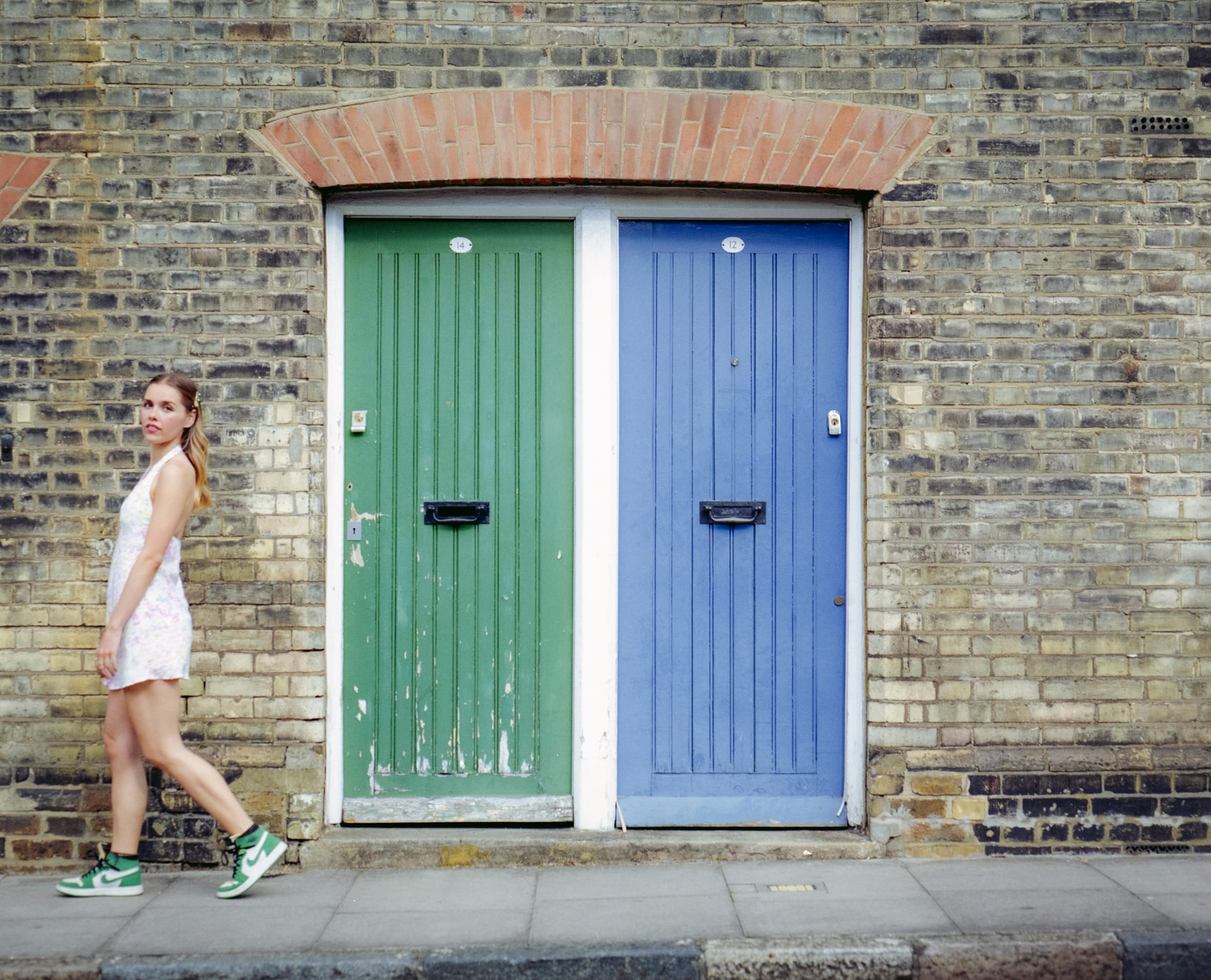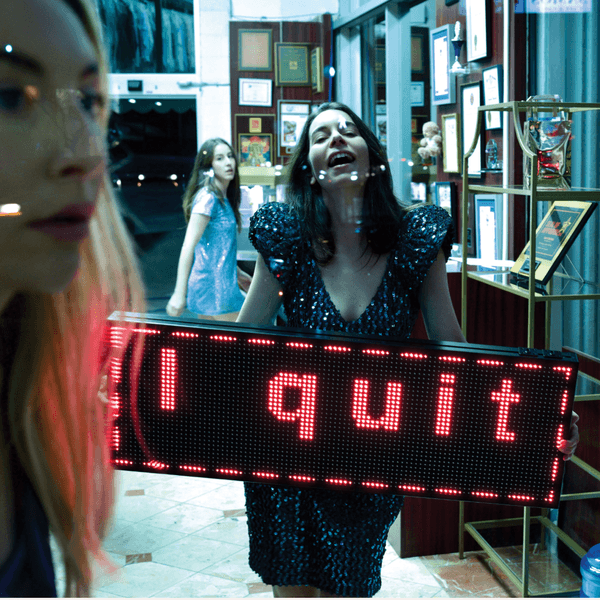
On the Rise
Ava Joe
Devon-born singer/songwriter Ava Joe is carving out space in the UK soul scene with a voice shaped by both pain and clarity.
Ava Joe’s voice carries the weight of lived experience. On the opening day of SXSW London, the 23-year-old steps off stage, leaving behind a confessional set.
For years, SXSW has remained a springboard for breakout acts – among them one of Ava’s key inspirations, Amy Winehouse, who began gaining traction in the US after her 2007 debut in Austin, Texas.
There is a quiet significance, then, to Joe performing at the festival’s inaugural London event; soul-rooted, razor sharp, and right on time – Not just due to the legacy the event carries, but rather her sound, rooted in similar tones to Winehouse of old-school soul.
Tucked away in a quiet corner of the green room, which doubles as a leafy courtyard behind the venue, Joe shares what life looks like beyond the showcase. “I’m just here for today,” she says, smiling. “But I’ve got sessions this week.”
Offstage, Joe speaks with the same soft intensity that runs through her debut EP, Try Me, a reflective project that explores the rawness of healing, control, and survival, with an element of diaristic lyricism and intimacy that allows listeners to be let in on something that sounds personal and sacred. Ava is cementing herself as a striking and fresh voice of the UK soul scene.

We chat about her childhood beginnings growing up in Devon, featuring a blended family of ten, where rock music was a constant backdrop thanks to her dad’s band rehearsals. The young Ava Joe dabbled in theatre, appearing in school plays and assemblies, and landing the angel role in nearly every nativity production; however, it was songwriting that drew her in deeper. That eventually led her to the BRIT School, an institution renowned for its ability to shape some of the UK’s most beloved acts, including two of her inspirations, Adele and Amy Winehouse.
Speaking on the experience with distance and clarity, Joe looks back on that time as quietly pivotal. “One thing that BRIT really did for me is it opened up music,” she says. “I was introduced to jazz musicians and funk and soul. It just opened everything up musically, completely.”
A self-proclaimed student of early 2000s-pop, the soulful artist was fascinated by the pop girls of the time, such as Lily Allen, Adele, Lady Gaga, and Britney Spears. But it was her time at BRIT, which introduced her to musical diversity and left a lasting impact on her musicianship. “Looking back, it was such a beautiful experience because it introduced me to so many different types of music. “If it wasn’t for BRIT, I definitely wouldn’t be the artist I am today.”
That same openness pulses through Joe’s five-track debut EP, Try Me, which maps and follows the emotional wreckage and knowledge left behind by a controlling relationship she had entered at just the age of sixteen. The songs sift through the aftermath with hard-won clarity, curiosity, and care, rather than looking back in only anger. Now, at twenty-three years old, Joe began writing the project after leaving the relationship, once enough distance had passed for the memories to soften and for perspective to sit in.
“It was definitely written in the healing process,” she says. “When I was in all of that dark stuff, it was just happening, I almost couldn’t write. It was like I just had to live it. But I always knew, going through it, there was a tiny little bit of hope. And that hope kept saying to me: ‘This is going to be for your music. You’re going to write about it.”
That experience is mirrored via the track “Polly Pocket,” one of the EP’s standouts. “Sometimes this happens when you’re writing — you’ll have a title already,” she explains. “So I knew that I wanted to write a song called ‘Polly Pocket’ and I knew what I wanted to write it about.”
The name appears as symbolic, offering listeners a glimpse into the slow process of reclaiming your voice. “I was in a relationship that was very, very controlling,” she says. “I was in quite a vulnerable, naive place in my life. I was only 16 when I met him. It was on and off for a very long time. But it got very dark… he would pretty much tell me what I can and can’t wear.” She pauses for a moment. “I wouldn’t have any of that now,” she firmly states.
I ask if writingTry Me helped her make peace with that version of herself. “It’s definitely helped me know what not to go for in a guy,” she says with a soft laugh, hinting briefly at where she is now, happier and more grounded. But the conversation quickly turns inward, as she reflects on the deeper inner workings of having more compassion for both her past and present self. “I think I give that younger place in me a lot of love and compassion,” she says.

Therapy has become an anchor in Ava’s personal life and work. It comes up as a framework for how she processes the past, approaches relationships, and creates music. “I actually just started, which is very long overdue,” she says. “It’s helping so much. It’s helping with my music too, because it’s allowing me to process things and give the creative space in me way more free flow.”
And that space is crucial to her process. “Music is something that I go to and turn to when no one else is there,” she says. “It helps me through everything. It’s never left me. It’s never going to take anything from me. It’s never going to let me down or leave.”
That sense of musical safety grounds Ava, even as the shape of her sound continues to shift with her. Joe is still discovering her sound and voice, literally and artistically. “I still feel like I’ve got such a long way to define my genre even further,” she says. “I feel like I’m trying out a lot of things and trying out different sounds to see what works.”
Adele was one of Joe’s earliest inspirations, and for a while, she imagined a more straightforward path for herself—something clean-cut, classic, familiar. But life, as she puts it, had other plans. “After going through things, my voice changed with it,” she says. “Now you can almost hear the trauma in my voice, which is very strange. That’s why I love artists like Billie Holiday and Chet Baker. You can actually hear the pain.”
I tell her that her EP and aesthetic remind me of Lana Del Rey’s early days as Lizzy Grant, and she lights up, explaining how Lana is one of her inspirations and the impact that she’s had on female artists.
It tracks: Like Del Rey, Joe is drawn to the nostalgia that music brings. “It’s such a powerful feeling,” she says. “It’s like you miss it, but it fucking hurts. It’s gut-wrenching if you think of a certain memory and time. And when you hear a song and it makes you feel nostalgic even when you’ve never heard it before, that does something to me.”
You can hear that ache clearly on one of the unreleased tracks she performed during her SXSW set “Dreamer”, built on soft guitar and a sense of distance, like something playing quietly in the background on a long car ride home.

She’s already thinking about the music to come next. With pride supporting her EP, Joe says that she’s ready to continue to release new tracks. She listens to her own demos constantly, “trying to tie them in and see where I could go with it all,” but she still makes time to obsess over other artists such as Remy Bond and Blood Orange.
Though just beginning her music career, Try Me doesn’t feel like a first draft. It is an EP that arrives fully feeling, prioritizing truth over polish. “You have to be honest,” says Ava, like it’s something she’s still reminding herself. “You have to be vulnerable. The more vulnerable, the better the tune.”
The Try Me EP is out now
Get the Best Fit take on the week in music direct to your inbox every Friday








